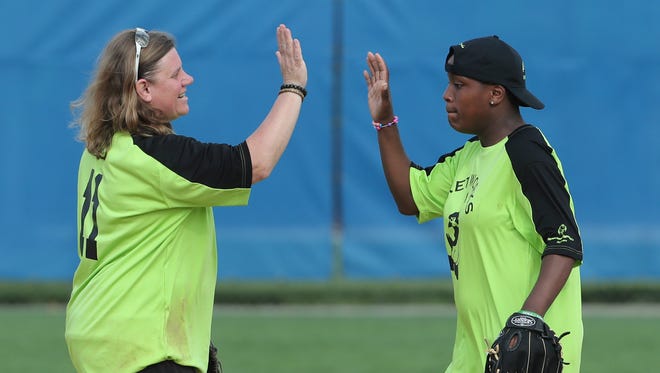Former US gold medalist Dionna Harris makes Special Olympics experience even more special
 Jerry Smith
Jerry Smith
Nearly everyone who knows Dionna Harris through her years as a teacher or a coach has asked to see or try on the gold medal she won as a softball player on the 1996 United States Olympic team.
"It's made the rounds, that's for sure," said Harris, who wears No. 11 on the back of her jersey now as a coach, just as she did during the Atlanta Games. "There have been a lot of kids who have worn it around their necks."

But while many of the athletes who participated in this weekend's 48th annual Delaware Special Olympics Summer Games strived to win their own gold medals, Harris said that isn’t the reason the majority of them take part.
The assistant coach and pitcher in the traditional division (coach pitch) for the Networks Penguins softball team from the Christina School District said it's really about the love of the game and the camaraderie.
"They learn teamwork and life's lessons at school (Networks School for Employability Skills) and on the field and that is very valuable," Harris said. "A lot of these kids hadn't played the game before this year and they have come so far."

So far, in fact, that they played in the championship game Saturday after defeating the Sussex Riptide 13-3 in the semifinals. The Penguins were later defeated 14-10 by the Kent Wild Kats to take the silver medal.
"The minute these players decided to be on this team they became winners," Harris said. "Regardless of the outcome of any game we play, they are winners."
Harris isn't the only one getting something from the Special Olympics experience. She said sharing the knowledge of the game she gained as a youth and high school player, then a player for Temple University and the '96 Olympic team has been very rewarding.
"They soak it up and have learned the importance of playing on a team outside of school and having good sportsmanship and that is so important," said Harris, who has been a volunteer with Special Olympics for about 20 years. "They are so dedicated."
Tyler Ridgley, a 20-year-old player from Bear, said Harris is a good coach and stays on him to do his best on the field just like she does in school.
"I'm glad to have her and the others as coaches," he said. "They make us work hard and we all have fun playing."

Softball was just one of the six sports being contested during the Summer Games on Friday and Saturday at the University of Delaware, which has hosted the Games for the past 30 years. The others included aquatics, bocce, powerlifting, tennis and track and field.
In all, 607 athletes and 82 unified partners (peers without disabilities) from 10 teams took part in the Special Olympics weekend, with 145 coaches and 83 team volunteers helping the athletes.

And while not everybody was fortunate enough to win a medal, those who did were ecstatic.
For Coltin Sligh, an 11-year-old track athlete for the Wilmington Wizards, winning the 100-meter Division 1 gold medal was a culmination of hours spent practicing on the track to become stronger and faster.
"I go to the track and have to run a lot, so this feels good," he said about winning the gold. "I really can't put it in words. I wear it proudly."
While the various stadiums, pools, courts and fieldhouses were swarming with Special Olympics athletes Friday and Saturday, it was the volunteers who organizers say helped make the event go off without a hitch.

Jon Buzby, director of media relations for Special Olympics of Delaware, said the weekend has gone more smoothly than officials could hope for and that is because the volunteers have stepped up.
"We've had a tremendous outpouring of volunteers," he said. "When you walk around here you see nothing but smiles and that's what we hope for in all of our events."
Buzby was especially appreciative of the coaches, who he said sometimes don't even have kids or relatives taking part in Special Olympics.
"They do it solely to make a difference and they really are doing that," he said. "This event is successful each year because of the dedication of the athletes, parents, coaches and volunteers."
Debbie Kearns, head coach of the Networks Penguins softball team, summed up the weekend and the experience.
"Special Olympics has given these students an opportunity they wouldn't have been able to do before," she said. "They have had such a good experience. This opens up so much for them."
Reach Jerry Smith at jsmith17@delawareonline.com. Follow him on Twitter at @JerrySmithTNJ.